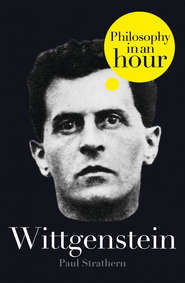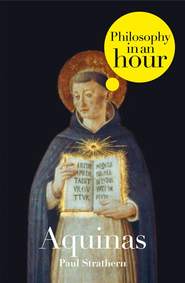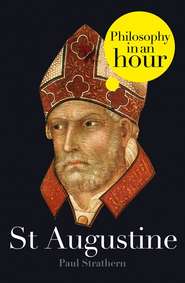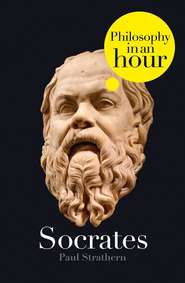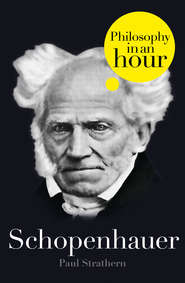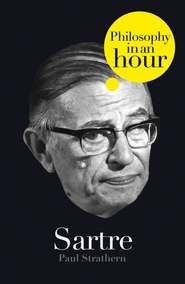По всем вопросам обращайтесь на: info@litportal.ru
(©) 2003-2024.
✖
Aristotle: Philosophy in an Hour
Настройки чтения
Размер шрифта
Высота строк
Поля
Paul Strathern
Philosophy for busy people. Read a succinct account of the philosophy of Aristotle in just one hour.The philosophy of Aristotle dominated Western thought for over a thousand years. He had a mind that mastered all disciplines from mathematics to politics and had a continuing impact on every sphere of knowledge he touched. Above all, Aristotle is credited with the founding of logic. He divided human knowledge into separate categories, and enabled our understanding of the world to develop in a systematic fashion.Here is a concise, expert account of Aristotle’s life and philosophical ideas – entertainingly written and easy to understand. Also included are selections from Aristotle’s work, suggested further reading, and chronologies that place Aristotle in the context of the broader scheme of philosophy.
Aristotle
PHILOSOPHY IN AN HOUR
Paul Strathern
Contents
Cover (#uf327bfb5-9ad7-584d-9a4f-be537bbff67b)
Title Page (#ud4c0c4f2-7cba-5d84-9504-ee2b275015d6)
Introduction
Aristotle’s Life and Works (#u9a5347ac-0693-510f-a5e2-59f4041b1daa)
Afterword (#litres_trial_promo)
Further Information (#litres_trial_promo)
From Aristotle’s Writings
Chronology of Significant Philosophical Dates
Chronology of Aristotle’s Life
Chronology of Aristotle’s Era
Recommended Reading
A Note on the Author
Copyright
About the Publisher
Introduction (#uc5560bd7-b394-5e62-9f6f-08a4148a2b11)
Aristotle was perhaps the first and the greatest of all polymaths. He is known to have written on everything from the shape of seashells to sterility, from speculations on the nature of the soul to meteorology, poetry and art, and even the interpretation of dreams. He is said to have transformed every field of knowledge that he touched (apart from mathematics, where Plato and Platonic thought remained supreme). Above all, Aristotle is credited with the founding of logic.
When Aristotle first divided human knowledge into separate categories, this enabled our understanding of the world to develop in a systematic fashion. But in recent centuries our knowledge expanded to the point where it was being seriously hindered by this categorisation. Such systems of thought allowed knowledge to develop only along certain predetermined paths, many of which were in danger of petering out. A radically different approach was needed. The result is the modern world of science.
The fact that it took us over twenty centuries to discover these limitations in Aristotle’s thought only demonstrates his unparalleled originality. Yet even the demise of Aristotelian thought has given rise to many fascinating philosophical questions. How many more of these limitations have we yet to discover? How dangerous are these flaws in our way of thinking? And exactly what are they preventing us from learning?
Aristotle’s Life and Works (#uc5560bd7-b394-5e62-9f6f-08a4148a2b11)
On a promontory above the village of Stagira, in northern Greece, stands a rather uninspired modern statue of Aristotle. Its expressionless face gazes out over the lumpy wooded hills toward the distant blue Aegean. Aristotle’s pristine white marble form, almost luminescent in the brilliant sunlight, wears a décolleté toga and sandals, bearing a slightly chipped scroll in its left hand. (This damage is said to be the work of a souvenir-hunting Argentinean philosophy professor.) Carved into the plinth in Greek are the words ‘Aristotle the Stagirite’.
Aristotle was born at Stagira, but despite the statue he wasn’t born in the modern village of Stagira. According to the guide book he was born in nearby ancient Stagira, whose ruins are still visible. After my disappointing encounter with the statue, I set off to find the ruins. These were somewhere just down the road, I was told by a young Batman returning home from school. With a flourish of his black plastic cloak, he indicated the road to the coast.
After an hour’s sweltering walk down the long winding road, with the thunder rumbling ominously around the rocky hills above me, I was eventually given a lift to Stratoni, an eerie combination of deserted seaside resort and mining village. Ancient Stagira lay somewhere off the old road a bit farther to the north, I was told by a carpenter who was repairing the closed café on the empty waterfront.
Few cars travel on this road in October, as I was soon to discover. And the autumn storms in this region, when they eventually break, can be severe. For an hour I sheltered beneath a narrow ledge of rock as the torrential downpour cascaded over the bare hillside with no sign of ruins or vehicles visible in the flickering, crashing gloom around me. Soaked to the skin, I raged to myself about the statue of Aristotle which had led me to Stagira, the wrong Stagira. It was nothing more than a fraud. The modern village of Stagira had no claim whatsoever to be known as Aristotle’s birthplace, apart from fortuitously sharing the same name. Why, by the same token they might just as well erect a statue of Joan of Arc in New Orleans …
Aristotle was born in 384 B.C. at ancient Stagira in Greek Macedonia. In the fourth century B.C. Macedonia was regarded by the ancient Greeks in much the same way as the modern French regard Britain and America. But Stagira was not beyond the pale of civilization. This was a small Greek colony founded by the Aegean island of Andros.
Aristotle’s father Nicomachus had been personal physician to Amyntas, the king of Macedon and grandfather of Alexander the Great. As a result of this connection, which had ripened into friendship, Aristotle’s father seems to have become a rich man, acquiring estates around Stagira and elsewhere in Greece. The young Aristotle was brought up in an atmosphere of medical learning, but his father died when he was still young. Aristotle was then taken to Atarneus, a Greek city on the coast of Asia Minor, where he was brought up by his cousin Proxenus.
Like many an heir to a fortune, Aristotle soon began spending his inherited cash in determined fashion. According to one story, he blew the lot on wine, women, and song and ended up so broke that he was forced to join the army for a spell. After this he returned to Stagira where he took up medicine. Then, at the age of thirty, he gave it all up and set off for Athens to study at the Academy under Plato, where he remained for eight years. Later medieval hagiographers, determined to turn Aristotle into a saintly character, tended to ignore or discount these unthinkable calumnies. And sure enough, there is another version of Aristotle’s early manhood. According to this rather more boring (but admittedly rather more credible) story, Aristotle went straight to the Academy at the age of seventeen. Yet even some of the sources for this story allude to a brief playboy interlude.
Either way, Aristotle soon settled down to a period of intense study at the Academy, quickly establishing himself as the finest mind of his generation. Initially he was a student, but he was soon invited to become one of Plato’s colleagues. It seems that to begin with, Aristotle worshiped Plato. He certainly absorbed all the Platonic doctrine that was taught at the Academy, and his own philosophy was to be firmly grounded in its principles.
But Aristotle was far too bright to be a mere follower of anyone, even Plato. When Aristotle discerned what appeared to be a contradiction (or, heaven forbid, a flaw) in the works of his master, he felt it his intellectual duty to point this out. This habit soon began to irritate Plato, and though they appear not to have quarreled, the evidence suggests that the two greatest minds of their age soon found it politic to maintain a certain distance. Plato is known to have referred to Aristotle as ‘the mind on legs’ and to have called his house ‘the reading shop’. This latter remark referred to Aristotle’s famous collection of ancient scrolls. Aristotle was in the habit of buying up as many rare scrolls of ancient works as he could lay his hands on, and was one of the first private citizens to own a library.
The young academic evidently received a considerable income from his inherited estates and soon became known in Athens for his cultured manners and gracious (if rather scholarly) lifestyle. Tradition has it that he was a weedy fellow, with spindly legs, who spoke with a lisp. Perhaps to compensate for this he became a natty dresser, donning the latest fashion in sandals and togas, and adorning his fingers with tastefully jeweled rings. Even Plato, who was no pauper, envied Aristotle his library. Yet despite Aristotle’s comfortable and refined way of life, his early works (now lost) were mainly dialogues discussing the base futility of existence and the joys of the hereafter.
Aristotle had a natural inclination toward the practical and the scientific. This led him to view Plato’s ideas from an increasingly realistic standpoint. Plato believed that the particular world we perceive around us consists of mere appearances. The ultimate reality lies in a further world of ideas, which resemble forms or ideals. The particular objects of the world we perceive derive their reality only by partaking in this ultimate world of ideas. Thus a particular cat, such as the black one I can see lying on the chair, is only a cat because it partakes in the ultimate idea (or form) of cattiness; and it is only black insofar as it partakes in the idea (or ideal) of black. The only true reality lies beyond the world we perceivein this ultimate realm of ideas.
Where Plato’s approach to the world was essentially religious, Aristotle’s tended toward the scientific. This made him disinclined to dismiss the world around us as unreal. But he did continue to divide things into primary and secondary substances. Except that for Aristotle the primary substances were the particular objects of the world, and the secondary substances were the ideas or forms. Initially he dithered about which of these substances was in fact the ultimate reality, partly out of respect for Plato. (His old teacher had, after all, suggested this conception in the first place.) But gradually Aristotle became more and more convinced that he was living in the real world, and he shifted away from Plato’s view.
Over the years Aristotle virtually turned Plato’s philosophy on its head. Despite this, his metaphysical theories remain recognisably an adaptation of Plato’s. Where Plato viewed forms as ideas that had a separate existence, Aristotle saw forms (or universals, as he called them) more as essences embodied in the substance of the world, with no separate existence of their own. Aristotle was to offer a number of devastating arguments against Plato’s Theory of Ideas but appears not to have appreciated that these criticisms were equally devastating to his own Theory of Universals. Yet no one else seemed to notice this either. As a result, it was largely in the form of Aristotle’s modified doctrine that Plato’s theories were to become the dominant philosophy of the medieval world.
Fortunately there were many obscure points and apparent contradictions in Aristotle’s works, which gave medieval scholars food for endless controversy arising from different interpretations. These arguments over errors, heresies, schismatic misbeliefs, and devil-inspired misinterpretations kept alive the notion of philosophy, when to all intents and purposes the entire enterprise had died (or, perhaps more accurately, had entered a long Rip van Winkle period). It has been suggested that a number of these controversies arose from simple clerical errors, the result of medieval copyists inserting their own guesses in place of words that were no longer legible in the original worm-eaten texts.
In 347 B.C. Plato died, and the position of head of the Academy fell vacant. Half a dozen of Plato’s most able colleagues judged there was only one man fit to take over this prestigious post. Unfortunately, each of them had a different man in mind (usually himself). Here Aristotle was no exception. To his disgust Speusippus, Plato’s cousin, was eventually given the job. Speusippus is known to have been so bad-tempered that on one occasion he tossed his dog into a well for barking during his lectures. Eventually he administered euthanasia to himself after becoming an object of public ridicule during an exchange with Diogenes the Cynic in the Agora. Speusippus was scarcely the intellectual equal of the man whose doctrines were to lay the foundations for all serious intellectual thought for the next two millennia, and on his appointment Aristotle left Athens in high dudgeon, accompanied by his friend Xenocrates (another disappointed candidate).
Aristotle sailed across the Aegean to Atarneus, where he had spent his youth. This was now ruled by the eunuch Hermias, a Greek mercenary who had managed to take over this corner of Asia Minor. On a visit to Athens, Hermias had been highly impressed by what he had seen of the Academy, and he now welcomed Aristotle with open arms. Hermias was determined to make Atarneus a center of Greek culture, and Aristotle began advising him on the best way to go about this.
Aristotle’s political philosophy consists largely of an examination of the different types of state, and how best they can be run. His understanding of politics is profound. This led him to adopt a pragmatic attitude, in direct contrast to Plato’s idealistic approach. In The Republic Plato had described how a philosopher-king should rule his utopia (which, like any utopia, was in fact little more than a tyranny). Aristotle, on the other hand, described how to run an actual state, outlining effective courses of action that often almost anticipate Machiavelli.
Aristotle knew how politics worked and knew that it had to be effective to be of any use at all. This is not to say he was devoid of ideals. On the whole, Aristotle believed that the purpose of the state was to produce and support a class of cultured gentlemen such as himself – though he understands that this is not always possible. For instance, in order to run a tyranny successfully its ruler must behave like a tyrant. In such a police state there would be no room for Aristotle’s cultured elite. Although at one point he does suggest that there is another way to run a tyranny: the tyrant can assume a religious pose and adopt a policy of moderation.
Some say this moderate approach is the one Aristotle probably adopted while tutoring the tyrant Hermias. In my view this is unlikely. Yet I am not suggesting that Aristotle would have advocated his own recommended means for maintaining a full-blown tyranny – which he described in chilling detail. In Aristotle’s view, if you wished to run a tyranny properly it was necessary to run a tight ship. Liberal cultural activity must be banned and the population kept in fear and poverty and set to work building great public monuments, with occasional interludes of war to keep them alert and demonstrate their need to maintain a great leader. (Aristotle’s analysis remains relevant, from Plato’s philosopher-king to Saddam Hussein.)
Aristotle evolved his political philosophy during his later years. At the time he was tutoring Hermias he probably adhered to the ideas expressed in Plato’s Republic. If so, he may well have tactfully modified Plato’s doctrine of the philosopher-king. It was not necessary for a eunuch-tyrant to become a philosopher; instead he should just be sure to follow the advice of one.
Aristotle was now approaching middle age. Despite his dandyism, he was considered very much the dry-as-dust professorial type. Then, to the surprise of all who knew him, Aristotle fell in love. The object of his affections was a young girl called Pythias, who is known to have been part of Hermias’s household. Some say she was Hermias’s sister, others that she was his adopted daughter. Other usually reliable sources claim that she was originally Hermias’s concubine (which must have been something of a sinecure considering his sexual status). These contradictions suggest that she may well have been a palace courtesan. Was this an early case of the besotted professor falling for his Blue Angel?
Pythias wasn’t a virgin when Aristotle married her, judging from his pronouncement: ‘once they have actually become married and call each other man and wife, it is quite wrong for a man or a woman to be unfaithful’ – implying that before this it’s okay. This pronouncement is found in Aristotle’s remarks about adultery, and it appears that on such personal matters he was in the habit of generalising from his own rather limited experience. In his remarks on marriage he asserts that the best age to marry is thirty-seven for a man and eighteen for a woman, precisely the ages at which he and Pythias were married. Brilliant though Aristotle may have been, imagination was not always his strong point.
Вы ознакомились с фрагментом книги.
Приобретайте полный текст книги у нашего партнера:
Приобретайте полный текст книги у нашего партнера:






